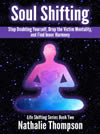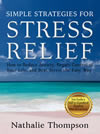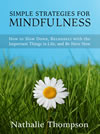 Stress may be a fact of life, but we don’t have to let it get the better of us. Constantly allowing ourselves to become frazzled and overwhelmed by life leads to long term mental and physical health issues that we’d all rather avoid, and it causes us to lose our ability to enjoy all the beauty and pleasure that life has to offer.
Stress may be a fact of life, but we don’t have to let it get the better of us. Constantly allowing ourselves to become frazzled and overwhelmed by life leads to long term mental and physical health issues that we’d all rather avoid, and it causes us to lose our ability to enjoy all the beauty and pleasure that life has to offer.
Finding the strategies for stress relief that are right for you is a matter of trial and error. Take a look at all the techniques below, and if any of them appeal to you, try them out! Everyone is unique, and our reactions to stressful situations are also unique. Figure out what works best for you, and understand that what works for you in one situation may not work in another, so feel free to mix-and-match and use different strategies at different times.
20 Strategies for Stress Relief
1. Simplify. One of the biggest areas of stress in many people’s lives is clutter. Being surrounded by chaos all the time can really have an impact on your mental health. Dedicate some time to decluttering your home, and you will likely notice an immediate decrease in your stress levels!
2. Use affirmations. When a negative thought habit becomes ingrained and automatic, you may be causing yourself all sorts of unnecessary stress just because you’ve formed a habit of expecting to be stressed. Create affirmations to help you change your thought habits and you will notice yourself becoming naturally more relaxed and at ease.
 3. Find a furry friend. If you’re fortunate enough to have a pet like a cat or a dog, take a minute or two to just to pet your furry friend. You’ll probably both feel better! Numerous studies have shown that spending time with friendly furry animals reduces blood pressure and anxiety levels.
3. Find a furry friend. If you’re fortunate enough to have a pet like a cat or a dog, take a minute or two to just to pet your furry friend. You’ll probably both feel better! Numerous studies have shown that spending time with friendly furry animals reduces blood pressure and anxiety levels.
4. Let go of perfectionism. Expecting yourself to be perfect at everything you do is the perfect way to set yourself up for stress. If you find that you are constantly criticizing yourself for not being good enough, learn to let it go. Let go of perfectionism, be gentle with yourself and realize that you don’t have to be perfect in order to be awesome.
5. Avoid situations that stress you. For example, I’ve stopped watching the evening news because it’s usually full of awful stories that do nothing but upset me. If you get stressed by seeing and hearing things on TV or the radio, turn them off or flip the channel. Make it a point to avoid listening or watching at the times of day where the upsetting stories are most likely to be aired. You can catch your news on the Internet where you have a little more control over what you get inundated with.
6. Avoid negative people. If there is someone in your life who constantly causes you stress, or upsets you every time you interact with them, stop seeing them. Either minimize the amount of time you have to spend with that person, or just break off the relationship altogether. This is harder if it’s someone you live with or have to interact with on a regular basis so if you’re in that situation, try some of the other strategies to help buffer you for the times you do have to be exposed to that person.
7. Avoid hot-button topics. If talking about certain topics gets you riled up (for example, topics like religion, sports or politics) then stop talking about them. If someone brings one of your hot-button topics up, try steering the conversation in another direction (e.g. “Hey, how’s your garden doing this year?”). If you can’t redirect the conversation, then politely excuse yourself and go talk to someone else.
 8. Take charge of your schedule. If you’ve got too much stuff on your to-do list, perhaps it’s time to get clear on what tasks are necessary and what tasks are optional. Do the critical tasks and let the other ones go. Likewise, learn to say no; if you’ve got enough on your plate as it is, don’t agree to take on additional tasks.
8. Take charge of your schedule. If you’ve got too much stuff on your to-do list, perhaps it’s time to get clear on what tasks are necessary and what tasks are optional. Do the critical tasks and let the other ones go. Likewise, learn to say no; if you’ve got enough on your plate as it is, don’t agree to take on additional tasks.
9. Reframe the problem. Try to look at the stressful situation from a different perspective. Instead of getting upset over being stuck in a traffic jam, think of it as bonus time for listening to your favourite tunes or affirmations. (Plan ahead and keep a CD in your car!)
10. Look at the big picture. Something I’ve found useful for the stressors in my own life is asking myself if whatever seems to be such a big issue at the moment will matter in 5 years, or even in a month. Just that one little shift in perspective can make a huge difference in how I react to the situation.
11. Focus on appreciation. Take some time every day to think of all the things you appreciate in your life, all the things that you are thankful for, and all the things that make you happy. This will instantly reduce your stress levels and shift you to a more positive mood!
12. Laugh more. They say laughter is the medicine, and it’s true! Laughter has been shown to reduce tension and stress, so watch a comedy, browse funny pins on Pinterest, or ask a little kid to tell you his best knock-knock joke.
13. Schedule some relaxation time.
If you’ve blocked off a time slot specifically for relaxation and added it to your schedule the same way you add all your other tasks, you’re less likely to overlook it or not do it. Protect your “me” time and don’t let other tasks or responsibilities encroach on this time.
14. Build your tribe. Surround yourself only with people who uplift and support you; people you are happy to be around. If you are living with people who constantly bring you down and you are not able to change your living situation, then find friends that make you happy. Online friends count, too, so check out blogs and forums dedicated to the things you are interested in and make some connections!
15. Do your thing. Your hobbies and the things that you are interested in are an integral part of who you are, and you need to give yourself permission to express yourself through these means. When we deny ourselves the pleasure of doing the things we enjoy, it can increase our anxiety and stress levels. Take time to do the things you enjoy!
16. Work it out. Regular physical exercise is a great way to release tension and stress. Take a walk in the sunshine, or head to the gym and spend some time on the treadmill. Go to a yoga class or try out tae-boxing or Zumba for something fun and different. The key is to find an activity that you really enjoy doing – something that you will actually look forward to! And if you’re not a treadmill or gym type of person (I’m not), then put on your favourite happy tunes and dance around your kitchen!
 17. Eat well. Healthy bodies need proper nutrition to function properly and cope with every day stressors. If you’re unsure about what types of food are best for you, consider seeing a naturopath or dietician for advice. If you’re constantly under a lot of stress, ask if you should be adding a vitamin supplement to your diet, as well.
17. Eat well. Healthy bodies need proper nutrition to function properly and cope with every day stressors. If you’re unsure about what types of food are best for you, consider seeing a naturopath or dietician for advice. If you’re constantly under a lot of stress, ask if you should be adding a vitamin supplement to your diet, as well.
18. Get some rest. Getting enough sleep is critical for handling stress. We all have a tendency to try and cram more into our days at the expense of our sleep time. But constantly reducing the amount of sleep we get results in sleep deprivation that taxes our ability to cope with life.
19. Plan ahead. Planning ahead and thinking about how long it will take to get somewhere and what you’ll need to bring can help you avoid the stress of constantly feeling like you’re running late. It can also help you avoid running out the door and forgetting something critical (like a diaper bag)!
20. Engage your senses. Try a multi-pronged stress management approach that includes all of your senses! Post images in your office or work space that help you relax, and add some natural elements like a green plant or colourful flowers. Open the window and listen to sounds of nature, or listen to your favourite relaxing music. Make yourself a fragrant cup of tea and close your eyes for a moment while you enjoy the taste, the warmth and the scent (I highly recommend the pina colada rooibos from Steeped Tea; it’s my go-to relaxation brew… just the smell of that tea is enough to melt my tension away!).
Learning to cope with stress involves accepting responsibility for our own lives and our reactions to the events and circumstances therein; it involves reclaiming our power, and making the choice to create positive changes in our thoughts and habits by deliberating choosing to find and use strategies that work for us. Give these strategies for stress relief a try and start letting go of stress and increasing relaxation, joy and tranquility!

















